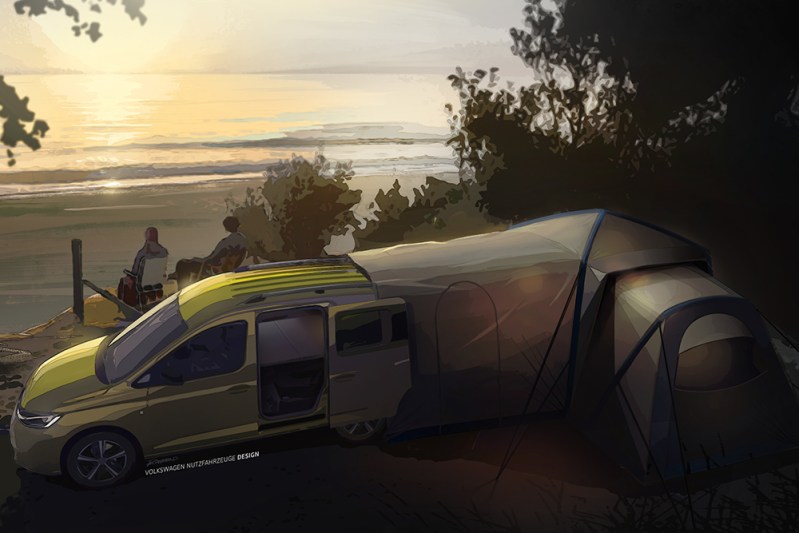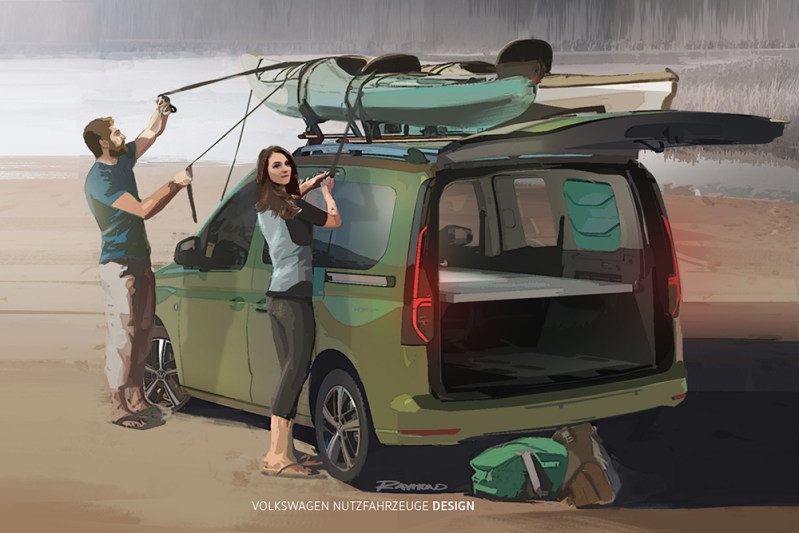
The modern vanlife movement has taken on a life of its own. Perusing #vanlife on Instagram reveals an endless gallery of hyper-stylized conversion vans whose designs rival most upscale studio apartments. But, many feel more like statement pieces than practical, mobile living solutions. Now, Volkswagen wants to get back to basics with an affordable, pint-sized campervan that promises everything road-trippers need and nothing they don’t.
According to concept sketches, the new VW Caddy Mini-Camper is designed as a basecamp for couples and small families. The “compact mobile home” steals a few RV-style innovations from VW’s larger California and Grand California van models. Those include compact, lightweight camping chairs and a matching table, plus hanging storage bags that double as roll-down privacy screens for the rear windows. A six-foot-long bed with plush disc-spring elements also makes for comfortable overnighting in the front country. However, the Mini-Camper’s pièce de résistance is a massive, 15-square-foot glass roof that’s purpose-built for stargazing. For extra privacy, passengers can darken all of the windows, including that roof, at the push of a button. The concept drawings also hint at an optional rear hatch tent that would more than double the Mini-Camper’s available living space.
Under the hood will be an ultra-reliable, four-cylinder diesel pushing either 74 or 121 horsepower, depending on the model. The new engine uses a clever twin dosing system to reduce nitrogen emissions, making it one of the world’s cleanest-burning diesels. A turbocharged, 113-horsepower gasoline-powered alternative will be a likely option. Volkswagen also promises a long list of 19 standard electronic safety systems, including Travel Assist (adaptive cruise control), Side Assist, and Rear Traffic alerts. A Trailer Assist feature will also make it easier to tow and reverse-maneuver a travel trailer or popup camper.

The Caddy Mini-Camper isn’t an all-new vehicle. It’s rather an extension of Volkswagen’s popular Caddy minivan that’s now in its fifth generation. In Europe, the compact van has become a go-to base model for anyone looking to customize their rig to haul people, gear, goods, or anything at all, really. The longer wheelbase Caddy Maxi edition even boasts enough floor space for two standard European pallets. While the base models are designed as workhorse vehicles, VW offers plenty of modern conveniences — LED headlights, keyless ignition, and a panoramic sunroof — as well.
VW will virtually debut the Caddy Mini-Camper in September, and it’s suggesting an official release by mid-2021. Volkswagen has yet to confirm, however, whether it will be available to U.S. buyers.
If you just can’t wait, check out Ready Set Van’s customizable, all-electric campervan alternative, available right now.


